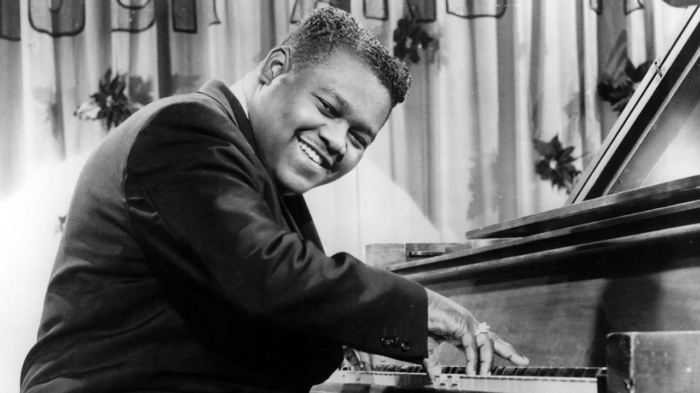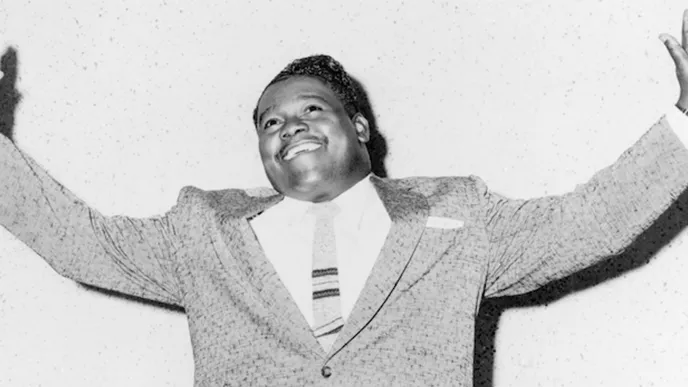
You never hear a bad thing about him. There’s the famous moment at Elvis’ 1968 press conference in Las Vegas, where Fats Domino is standing off to the side, and Elvis puts his arm around him and says to the press, “This here is the real King of rock ‘n’ roll.” Domino was a front-runner, he wasn’t exactly a pioneer, or not how I think of pioneers. Someone like Blind Lemon Jefferson was a pioneer. Rosetta Tharpe was a pioneer. If you listen to Domino’s stuff … it puts the lie to the whole “the first rock ‘n roll record was ____” and it’s always something from 1951-1953. It’s like a totally manufactured demarcation line, and it cuts people out of the picture. Fats Domino was doing rock ‘n roll in the 1940s. Sam Phillips‘ place in history is secure, but stop it. Domino was the first to sell a million records and he did it in 1949.

Antoine Dominique Domino Jr. hailed from New Orleans from a French Creole family. Louisiana Creole was his first language. He grew up in poverty but his world was steeped in music. He always loved it. He seemed to be built different. He had happiness built into him. He started playing piano very young and was already playing out in clubs as a teenager. Humble beginnings. This roly-poly boy would go on to be one of the most successful recording artists of the 50s, recording songs which went on to sell millions and millions of copies (and still counting).
Cosimo Matassa ran a little studio behind his parents’ appliance store, and he worked as engineer on the very rudimentary equipment he gathered together (he came from a mechanical background, see “appliance store”) and band leader Dave Bartholomew recorded a lot of these New Orleans artists, capturing the local sound – the mix of cultures/styles unique to the area. Bartholomew put together an unofficial house band.

Fats Domino, Cosimo Matassa, and Dave Bartholomew
Domino was drawing in crowds to his shows, so Cosimo and Bartholomew had him in to record him. It was Bartholomew who put together the song that would become Domino’s signature song, “The Fat Man”, a sort of response to the very popular “Thin Man” radio series. It’s 1949-50. “Fat Man” is an incredibly important record.
“Fat Man” was his first monster hit, and it was a monster hit the likes of which the world had never really seen up until that point, or at least with the new technology of recording/radio/distribution. All of these were relatively recent developments in music. It sold millions. Domino got rich. He could have gotten rich just off that. But he kept going. He was second only to Elvis in sales in the ’50s. Think about that. He recorded hit after hit, dominating the 1950s – when it was a very HARD decade to dominate in, due to the Elvis factor.
I mean, “Blueberry Hill”.
Elvis covered this one, and not nearly as well – and he would probably have said the same thing as well. He name-checked Fats Domino from the beginning. I think he even called him out on the Louisiana Hayride show, his earliest captured live recordings.
Domino eventually was surpassed in sales by the Beatles, but there’s no disgrace in THAT. They surpassed everyone. Domino’s estate STILL makes money.
He also, thankfully, lived long enough to benefit from nostalgia, and generational waves of interest in him, plus being used in soundtracks, which brought him more money, more attention. He showed up on television, his live concerts were recorded, and you can spend hours on YouTube enjoying him live.
And stuff like this!
Domino was a remarkably stable man. He was married for 61 years. He lived in the same house he bought with his first million. (Sadly, he lost it in Katrina.) He is a national treasure. Or, at least, we should be very proud that even with all our ugliness, and the terrible legacy of racism, we still can produce someone like Fats Domino. It is a testament to us, sure, but more than anything it’s a testament to what he brought to the table, and his insistence that he deserved to be heard, and that he had joy he wanted – needed – COULD – spread to the rest of us. For generations to come.

Thank you so much for stopping by. If you like what I do, and if you feel inclined to support my work, here’s a link to my Venmo account. And I’ve launched a Substack, Sheila Variations 2.0, if you’d like to subscribe.




the top picture. Fats playing the piano. Can you advise where that picture was taken? I might have that actual piano in my sunroom. That is, if that pic was taken on the Louisiana Hayride stage. Probably not but just curious
wow, really! I’m not sure where I grabbed it – it comes up multiple times when you Google his name. it looks like maybe it’s Louisiana Hayride from the curtain behind but I’m not sure.
If you look at this piece, the image is used for every entry,